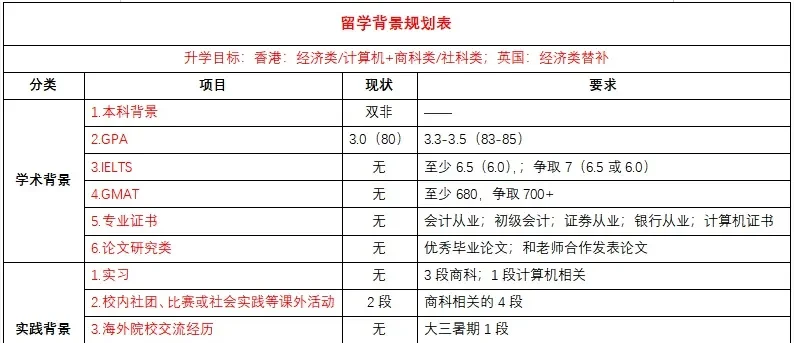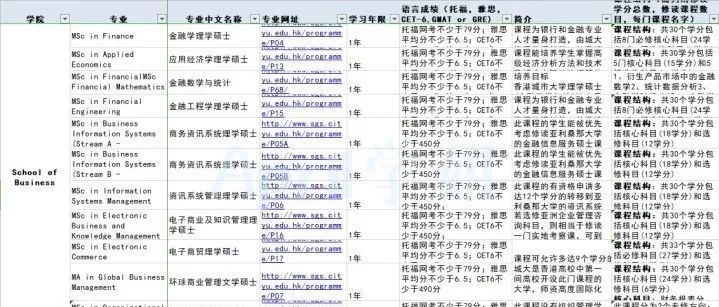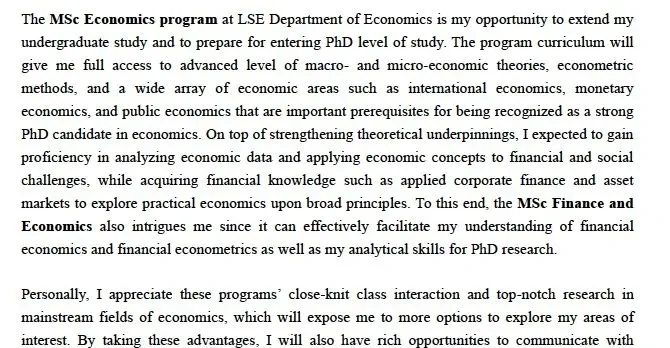Yishan uses an article to tell you that if you want to apply to your ideal school,
What preparations should be made during college, how to do it, to what standard and when is the best time to start preparing!
After reading it, you will immediately get an epiphany and find the right direction!
If you have a clear goal for studying abroad, the earlier you prepare, the better. I assume that you have a clear goal and are determined to study abroad in your freshman year. From your freshman year, I will directly give you a rough time plan (you can squeeze in time in your sophomore and junior years):
- Freshman to Senior Year:Maintain a good GPA. Even if you don't go abroad to study, it will be great to get a scholarship to study abroad.
- Freshman:Just think clearly about whether you want to study abroad. Campus life is the most fulfilling during the freshman year. My advice is to enjoy your college life.
- Sophomore year:Determine which region you want to study in (UK, New Zealand, US, Canada, Australia, Hong Kong, etc.), and whether to continue studying your major or consider changing it.
- Sophomore year:To prepare for the IELTS (TOEFL) exam, you can pass the CET-4 and CET-6 first; prepare your resume and consider looking for an internship or attending summer school to brush up your background during the summer vacation.
- Junior year:After the IELTS scores are released, compare the background information of seniors who have already received offers from the previous year to determine the specific school and major you want to apply for; consider whether to find an agent.
- Junior year:The IELTS/TOEFL GMAT/GRE scores are out, the first draft of the essay is completed, the recommenders are confirmed, and you can do scientific research with the teacher or continue your internship during the summer vacation.
- Senior Year:Apply online, interview and get the offer.
PS: Considering that each student is at a different stage of application and has a different background, the above is only a macro process and cannot provide detailed suggestions. So I specially take a few hours every day to do one-on-one school positioning and background planning for students who need help.
You just need to WeChat me Rene0550, fill in your undergraduate school, GPA, IELTS, internship and other background information truthfully, and then you will get a four-year study abroad plan (or three years, depending on your specific situation) that I made specifically for your background.
Then I will talk about how to prepare in detail, which mainly includes the following points. You can directly scroll to the part you need to read.
Step 1: Determine where to study
Step 2: Determine the major you want to apply for
Step 3: Develop an application plan
Step 4: Decide whether to find an agent
Step 5: Apply online
Step 1: Determine where to study
1. Without saying too much nonsense, the first thing to do when choosing where to study abroad is to check the specific costs of each study abroad area and whether your money is in place (normal standards):
- The United States, Canada and Australia:About RMB 500,000
- U.K:About RMB 300,000
- Singapore/Hong Kong:About RMB 250,000
- Countries with small languages such as Japan and South Korea:Within RMB 200,000
2. Second, look at your undergraduate background and how hard you think you can work:
- America / Canada:Studying abroad is of great value, but the competition is very fierce and the difficulty is also high.
- UK Australia:Most schools have cooperative relationships with agencies, and they have the largest number of students enrolled, and the largest number of Chinese students. If you want to go to the top 50 schools, you need to come up with something. The schools behind are generally not difficult unless they are the school's flagship majors.
- Hong Kong and Singapore:There are few schools, but they are all highly ranked. The difficulty is not easy, but not as high as in the United States.
- Minority language countries:Due to language barriers, not many people go there, but the cost is very low. If you can apply to a good school (such as the University of Tokyo), the cost-effectiveness is very high. Of course, the difficulty is not low (you have to learn a new language).
Step 2: Determine the major you want to apply for
In fact, it is not realistic to let you decide on your major in your freshman year, because many people fill out their applications randomly and are basically in a state of confusion. Therefore, we can regard the freshman year as an adaptation period. If you are interested in the major, you can continue to study in the major. If you are not interested, you will have an opportunity to change your major in your freshman year. You can seize it yourself. (In our school, only those with an average score of 30% are eligible to take the major change exam, and the importance of the average score is reflected again...)
If you are really unsure, just think about whether you want to study business, liberal arts, or science (you can't be unsure, right...), because this will determine which direction you should work towards during this period of time when you are unsure, whether you should take the GMAT or the GRE, whether you should do an internship as a copywriter or an accountant, etc.
Step 3: Develop an application plan
Here is an application planning form I made when I was DIY:

1. Academic background
1) Undergraduate: The general ladder is C9>985>211>first-tier>second-tier>third-tier>junior college/self-taught undergraduate. Look at your level and how much effort you need to put in. No more to say.
2) GPA: I think that if you want to go to the top 100, 3.0 (80 points) is the minimum threshold. Non-985/211 universities need to score 3-5 points higher than 985/211 universities to slightly offset the disadvantages of undergraduate studies. If you don’t have enough time, you can take the most professional courses in the second half of your sophomore year and the third year of your junior year. The scores are more important. If you do well in the exams, your GPA will go up a level.
3) IELTS/TOEFL: Most regions (English-speaking countries) accept TOEFL and IELTS, but my suggestion is to take TOEFL in the United States and IELTS in other places. 6.5 is a normal score (6 is already very low, and there are very few choices). If you want to go to the top 50, IELTS 7 and TOEFL 95 are relatively normal scores; if you are applying for popular majors such as business and media, there are many masters who have scored 7.5 or even 8 in the past two years...
In addition, preparing for the IELTS (TOEFL) is a very long process. There are many students who have taken the test 5,678 times and still scored 6 points. There are few students with high scores who have not been tortured by the IELTS all the way up. Moreover, if you delay until the peak application period, you may not even be able to grab a test seat... Due to the epidemic, there were no tests for several months, and grabbing a test seat later was like fighting a war.
For more information on how to prepare, please read my article:How to prepare for IELTS and GMAT with high scores
My suggestion is: it is best to pass the test before the second semester of junior year, especially if you have to take the GMAT. If you put it off until the end, you will end up with nothing! ! If you really can’t pass the test, the score should be released before the senior year online application (September) at the latest.
4) GMAT/GRE: Which one should you take, GRE or GMAT? First, it depends on the major. Finance, accounting, management, marketing and other general business majors choose GMAT; statistics is more science-oriented, economics is more social science-oriented, so choose GRE; second, it depends on the region. Both GRE and GMAT are applicable in Hong Kong and North America, but GMAT is more preferred in the Commonwealth region.
Not all majors need to take the exam. Some business majors require you to submit it (USA/Singapore). Please read the official website requirements carefully. If you don't have to submit it but your background is poor, a GMAT score of 700+ or a GRE score of 320+ will be a good plus for you.My suggestion is to prepare for GRE/GMAT after getting your IELTS score., because this is more difficult, prepare this first I'm afraid you can't handle it orz
For more information on how to prepare, please read my article:How to prepare for IELTS and GMAT with high scores
2. Practice background
1) Internship: The principle of finding an internship is that the degree of job matching > total internship length > company reputation. The relevance of the job to the applied major is more important than the company's reputation. Of course, it is best to go to a famous company, but it is better to go to a small company and work in some core positions instead of doing odd jobs there. The total duration should be more than 6 months.It is recommended that you start working on your resume in the second half of your sophomore year, and look for an internship during the summer vacation, which will be exactly six months in the second half of your junior year.
2) Scientific research: It is indispensable for applying for MPhil and PhD. There is no strict requirement for taught master's degree, but if you have it, you will be one level higher than your competitors with the same background, you know.Those who don’t have a good research project before the summer vacation of their junior year,Take the initiative to contact the teacher (the teacher is happy to accept you if he/she is in need of help and is short of staff during the summer vacation), and try to go to the teacher's laboratory to do some small projects during the summer vacation. If you are lucky, the teacher will directly publish an article under your name.
3) Studying abroad for exchange: This is a big plus (especially if you can get a recommendation letter from a foreign professor), but going on exchange will inevitably delay other processes. It is recommended to do so before the third year of college. If you don’t have time, don’t force yourself, as this is not a necessary item.
3. Documentation
1) PS: A personal statement of 800-1000 words, mainly including why you choose this major, your application advantages, your future career plan, etc. It requires a high level of English writing. In the application, it is the first impression you leave on the admissions officer, so you can't just write it casually.The first draft should be completed before the summer vacation of the junior year, and the final draft should be completed before the start of the senior year.
2) CV: resume, no more details
3) Determine the recommender: The principle for finding a recommender is that the teacher's connection with you > the teacher's connection with the major > the teacher's willingness > the teacher's professional title, position, and academic achievements. Two good choices are teachers who have taught your major or thesis supervisor, who are familiar with you and have a high degree of professional matching.
Step 4: Decide whether to find an agent
Whether you need to find an agent, you need to consider two questions:
1. Do you have time to make a summary of the majors you can apply for in each school, as shown in the figure below?

2. Can you accurately position yourself and choose your sprint/safe/backup school and major as shown in the picture below?
3. Are you confident that you can write a PS for yourself at the same level as the one shown below?

If you are not sure about completing the above two items, I suggest you find an agentInsufficient time for DIY may result in failure to improve the background that is more important for application; inaccurate positioning may cause one to miss out on the offer from the dream school or not get any offer at all.
If the first two items are OK but the third one is not OK, you can choose semi-DIY, just ask the essay teacher to help you write the essay.
Of course, if you have enough time, you can try DIYIf things really don’t work out in the future, you should find a good agent in your junior year. With an agent to guide you, the limited time you have can be used more effectively.
Step 5: Apply online
After the start of your senior year, you can prepare your application materials and submit your application online. The specific process is similar in each region, with only some differences in details.
Most universities include the following:
- School/education system registration
- Fill in the information form
- Upload the prepared documents, including PS, CV, transcripts, language scores, etc. Some schools may have additional documents that need to be notarized.
- Pay the application fee and submit
Finally, let me tell you about the one-to-one planning table mentioned at the beginning!
PS: When you contact me on WeChat, please be sure to clearly state your background and application expectations, so that I can make a plan that best suits you! Then, based on your background, Yishan will give you a one-on-one analysis and try to help every confused junior student solve their doubts! (After all, Yishan also went through this in the past TT)
The table might look like this:
- Line: Software and Hardware
Based on your measurements and your soft skills background, I will give you targeted suggestions. Regarding your target school and major (such as TOP50 pure business), I will analyze your GPA, I will give you the best answer, whether you need to take the GMAT, and what kind of internship will add the most points.
- Column: Time
First, I will give you the specific standards you need to achieve for each item. Then, from freshman to senior year, I will write down for you what you should do for each item and what standards you should achieve for each specific time period! If you are a sophomore or junior, please write it down in the form I sent you. I will give you a plan specifically for your current situation!

- Content: Targeted opinions
Taking the GPA requirement that a student needs to achieve in his sophomore year as an example, I will give you specific suggestions in each small box. You just need to follow them and meet the standards!
After getting the planning form, my suggestion is to print it out directly! Post it in a conspicuous place and motivate yourself at any time! With a general direction, you will never be confused when applying in the future! (Why didn’t anyone teach me how to plan when I applied!)
Besides, I know that if I just give you an application form, you will never be able to do it!!
So, I will give you a one-on-one supervision directly, add Yishan’s WeChat Rene0550,Report to me every week what you have done and how the progress is!